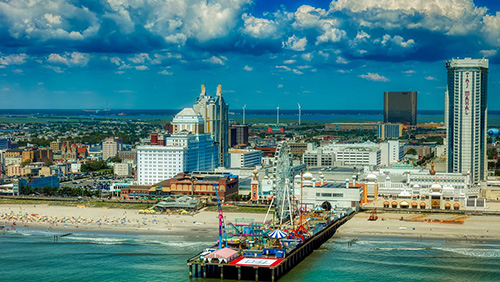Moody’s Investors Services, one of the top credit rating agencies in the U.S., doesn’t see a bright future for a lot of the municipalities in New Jersey, including the gambling capital of Atlantic City. Because of cutbacks issued by the state’s governor, Phil Murphy, Atlantic City and other regions are going to receive significantly less state money, which is ultimately going to hurt operations in those regions and Moody’s believes Atlantic City continues to be a “high credit risk.”
 Murphy announced earlier this month that he was suspending $235 million in spending items. The bulk of this — $104.8 million — is through transitional aid, which is money given to cities and towns that demonstrate they need temporary financial relief from the state. Atlantic City has received a total of $43.1 million in aid money over the past three years as gambling activity has continued to slide.
Murphy announced earlier this month that he was suspending $235 million in spending items. The bulk of this — $104.8 million — is through transitional aid, which is money given to cities and towns that demonstrate they need temporary financial relief from the state. Atlantic City has received a total of $43.1 million in aid money over the past three years as gambling activity has continued to slide.
Moody’s points out that the freeze will impact nine municipalities that have come to rely on the payments over the years. It adds, “Given the frequently razor-thin margins of error in distressed municipal budgets, a suspension can lead to the need for draconian cost-cutting or large tax increases.”
Murphy trimmed the fiscal year 2020 budget by $50 million when he signed off on the $38.7 billion package on June 30. He took the aid money out using his veto power after lawmakers refused to approve a “millionaires tax” he had requested. Despite the suspension of the funds, the state has said that it will continue to closely monitor the municipalities and could provide immediate support if necessary.
Despite the cuts, Moody’s is keeping Atlantic City’s rating the same. It currently sits as “B2/positive,” which means that the city is in the “speculative” class and should be considered a high credit risk. It added that Murphy’s decision to take control of the city this past April was a good idea, asserting, “State control has had a strong, positive effect on the city’s financial position, which remains weak.”
From 2014 to 2016, Atlantic City saw five of its gambling venues shut down. This led to a decrease in local tax revenue and an increase in debt. Disputes over property taxes by other casinos have also taken their toll on the city, bringing to fruition a prediction a couple of years ago that tax refunds would damage Atlantic City.